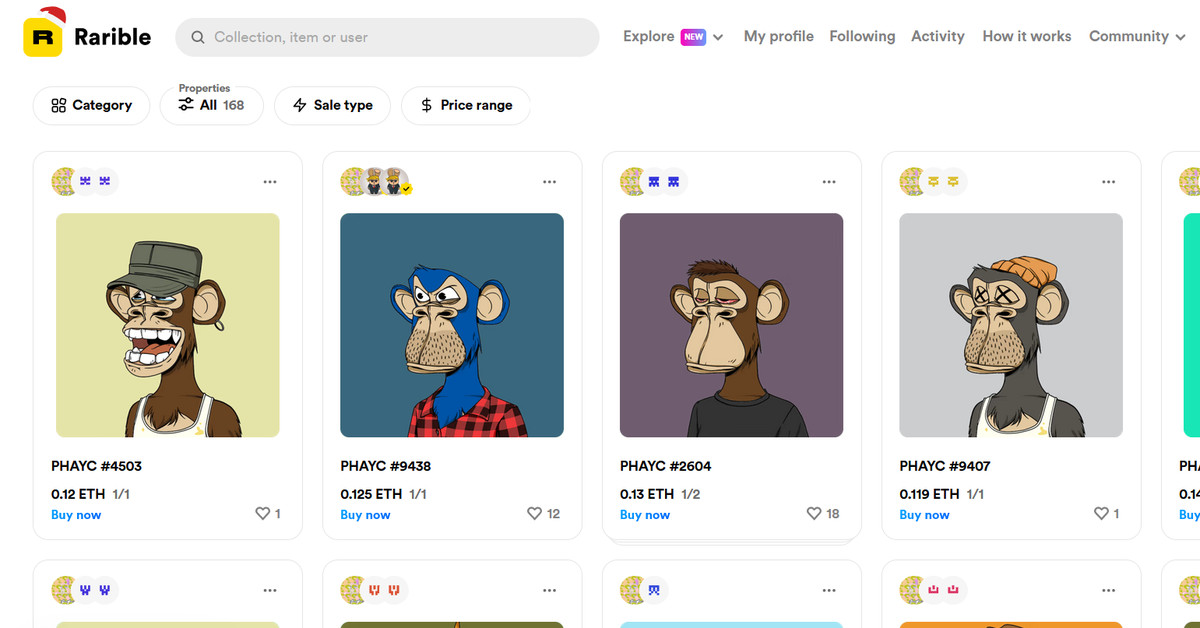[ad_1]
Two non-fungible token projects test the line between plagiarism and parody. The digital marketplace OpenSea has banned the PHAYC and Phunky Ape Yacht Club (or PAYC) collections, both of which are based on the same gimmick: selling NFTs with mirror-like but identical versions of the high-priced Bored Ape Yacht Club avatars. Now Duel Plans are selling their monkeys while avoiding bans from other markets, becoming the latest example of how the NFT world deals with copied art.
NFT Bored Ape Yacht Club (or BAYC) are among the most expensive crypto assets – they recently overtook CryptoPunks as the most expensive NFT avatars with the cheapest available monkey selling for $ 217,000. Like other avatars, however, anyone can technically copy or modify the associated monkey image. So PAYC and PHAYC simply flip right-facing BAYC avatars to left, pair them with cryptocurrency tokens, and resell them.
PAYC announced its launch early December with a loose mission statement promote decentralization and denigrating the “rich douchebags” who had (allegedly) taken over the original monkey market. He recalled CryptoPhunks, a similar project who returned and resold expensive CryptoPunks images earlier this year. Early comers could hit the left-facing monkeys for free starting December 28, while others paid a fee of 0.042 ETH (currently around $ 157).
PHAYC was launched soon after with a tongue-in-cheek website describing the project as “a limited NFT collection where the token itself offers no membership and no allegiance”, a reversal of the promise made by the creator of BAYC, Yuga Labs. A member of the PHAYC community describe the project to CoinDesk as “a satirical take on the current state of NFTs and members of the NFT community who might take the NFT market a little too seriously.”
Ironically, PAYC and PHAYC have since battled over Twitter over which one is the authentic Bored Ape Yacht Club Scam, with PAYC Founder referring to PHAYC as a “money seizure fraud schemeâ€. PHAYC instructed people to hit their monkeys, and CoinDesk reports that he made around 500 ETH (or around $ 1.8 million) in sales. In contrast, it states that PAYC made around 60 ETH (or around $ 225,000) from its paid sales.
Both projects may be in legally risky territory. It is common for NFT queues to copy each other’s artistic styles or use similar names. But Yuga Labs owns the copyright to its images of monkeys, and PAYC and PHAYC were started from OpenSea, apparently for breaking its rules against copyright infringement. (PAYC was also removed from competing Rarible and Mintable markets, although PHAYC is still listed on Rarible.) If Yuga Labs files a formal legal complaint, PAYC and PHAYC could potentially defend their monkeys as transformative fair use, according to the claims. traces of people like appropriation the artist Richard Prince. But there is very little legal precedent for TFNs, let alone their copyright implications in particular.
Yuga Labs did not immediately respond to a request for comment on the possibility of making such a complaint, and PHAYC did not respond to a Twitter post about the issue. PAYC Recount The edge on Twitter that he received no legal threat from the BAYC team.
So far, both projects seem more concerned with trying to make their monkeys tradable online. NFTs are theoretically supposed to live outside of any given platform, but markets like OpenSea have become huge bottlenecks in simplifying the selling process. While the sites have hosted many NFT projects based on stolen artwork, they’ve removed copies like CryptoPhunks in response to complaints from companies like CryptoPunks creator Larva Labs, and they’ve banned some. Individual NFTs that have been stolen from their owners. Both PAYC and PHAYC have tweeted that they are working in alternative markets that may sell the left-facing monkeys – although, as you read this, someone else might have started selling one even forger false monkey.
[ad_2]

